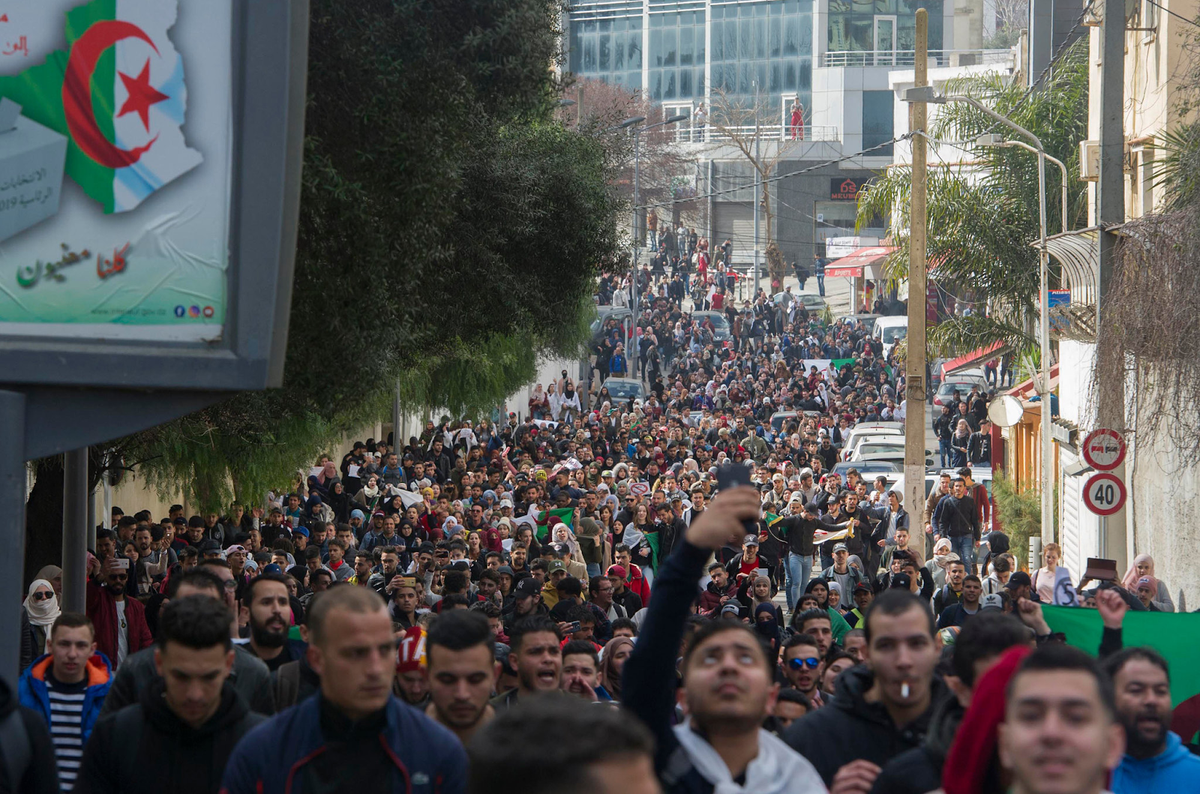Remove them all! One year into Algeria’s Revolution

By Assia Hamdi- BA History and Arabic
Since February 2019, millions of Algerians have been regularly protesting. To mark the one year anniversary since the uprisings began, what follows is a brief overview of Algeria’s Hirak Salmi (Peaceful Movement/Revolution), also known as the Revolution of Smiles.
Despite the name Revolution of Smiles, the Algerian people are protesting to demand a serious restructuring of the government. This includes the removal of the political elite (in particular, 25 Major Generals) and an government which places the Algerian people’s dignity, liberty, and democracy first. This revolution continues to persist due to the shared passion of the Algerian sha3ab (nation), and valuable lessons learnt from the country’s past.
“Les généraux à la poubelle et l’algérie tadi L’istiqlal” (The generals in the bin, Algeria will be Independent)
The protests began as a rejection of President Bouteflika’s fifth term. Bouteflika is 82 years old, unwell, and wheelchair-bound. The President has not been seen in public for over six years and yet his administration, which has been in power for 20 years, attempted to consolidate power. Success of the revolution was when, on 2 April 2019, Bouteflika resigned. His resignation became an opportunity to renegotiate the entire system of rule in Algeria.
Learning from Egypt during the Arab Spring, Algerian’s have realised that to truly have a chance at rebuilding their nation, by and for the people, they had to dismantle the whole system from the top down; politicians, businessmen and the military, who have each ensured democracy works in line with their capitalist material objectives since the end of the Civil War (1991-2002).
The impact of the Algerian Civil War can be felt to this day. The trauma experienced during the civil war paralysed the country’s revolutionary spirit. Immediately following the war, out-migration increased significantly and population growth decreased. Algeria’s gradual recovery and the younger generation has instilled new hope. The vast age range of protestors who have taken to the streets every Tuesday and Friday for 52 weeks highlight the potency of what the protesters are advocating for. Older Algerians are united by the fight for a better future for their grandchildren: “Les généraux à la poubelle et l’algérie tadi L’istiqlal” (The generals in the bin, Algeria will be Independent). Youth chant: “It’s them or us”.
On 19 July 2019, Algeria won the African Cup of Nations, fueling celebratory fervour already present due to the ongoing protests. The football victory has been a rallying point, seemingly demonstrating that the ongoing revolutionary spirit was rightly guided.
On 12 December 2019, the 34th week of protests, the thrice canceled elections finally occurred, with a 39.88% turn out (APS) with an average of 0.07% in Kabyle (Leparisien). Abdelmadjid Tebboune was elected by a small majority due to his open comments against the oligarchy of Algeria. However, most protesters view him as a loyalist to the old system. The popular protest chant, “No election with the gangs,” highlights the rejection of the entrenched, corrupt system that governs them.
On 26 December, General Ahmed Gaid Saleh, the military powerhouse of Algeria and the de-facto leader during the months of political uncertainty, has been a focal point of much expressed anger during protests and died under peculiar circumstances. Ahmed Gaid Saleh compared the current revolution to that of the Algerian civil war, claiming that protesting Algerians were trying to drag the country backward through violence and committing acts of internal terrorism and urban warfare. His anger and refusal to negotiate with his people’s demands of substantial reforms and full political restructuring highlight the disconnect between authority and civilians. The average age of Algerian government officials is 70 years old, while the median age of Algerian is 27.5: the disconnect between Algerian leadership is more than metaphorical, there are gaps of relatability and representation that are decades wide.
As Algeria moves into the another year of the revolution, the previous year filled with sit-ins, strikes, flower-gifting, rhythmic chanting, social-media mobilisation, student protests and millions of Algerians dedicating their time and efforts remain inspiring but evoke an endless quality to the revolution.
What is next for this revolution? Will the protestors be given the platform to negotiate with authority? Will President Tebboune meet the demands of his people? Time will only tell.



